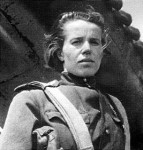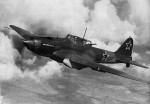Over Fields of Fire , by Anna Timofeeva-Egorova
, by Anna Timofeeva-Egorova
Red Sky, Black Death , by Anna Timofeeva-Egorova, edited by Kim Green
, by Anna Timofeeva-Egorova, edited by Kim Green


During the Second World War, a number of Soviet women served as night bomber pilots, flying the obsolescent Polikarpov biplane. A favorite tactic was to cut the engine and glide down almost noiselessly to the bomb-release point, and these flyers were known to the Germans as the “Night Witches.” A smaller number of Russian women flew IL-2 Sturmovik attack planes and also Yak and other fighters. The memoir reviewed here was written by a woman who first flew the biplanes and later became a Sturmovik pilot. (I read the first of the 2 books linked above and only just became aware of the second one; see remarks at the end of this post.)
Anna Egorova begins her memoir with a recollection of her feelings on the day (before the war) when she reported for training to begin her hoped-for career as a professional pilot:
In Unyanovsky, I rushed straight from the train station to the Venets–the highest spot above the Volga. And such an inconceivable space opened up before me from up here, such an expanse that it took my breath away!…And what a wonder, above the Volta covered by young December ice, a rainbow began to shine. It threw its multicoloured yoke from one bank to the other…Yet maybe I had just imagined it? But I was already laughing loudly, sure it was a rainbow and that it was a sign of luck. Again just like back at the Kazan train station in Moscow, waves of joy were coming from my chest and their splashes were curtaining the horizon with a rainbow mist.
Her ecstasy was short-lived, however. Soon she was summoned before the school commandant, informed that her brother had been discovered to be “an enemy of the people,” and she was expelled from the school. (“How could my brother be an enemy of the people? My brother was the people”)
Anna’s hometown was a tiny village, so small that it had only one street. As a teenager, she had been thrilled by the plans for construction of the Moscow Metro, and volunteered as a worker, doing heavy and sometimes dangerous construction work. At the time there was great interest in aviation throughout the Soviet Union; Anna joined a glider club and looked forward to becoming a full-fledged pilot. And when walking to the airfield on the morning of her first powered flight:
Victor Kroutov runs off the footpath, barges into the bushes, and I am presented with the first bouquet of flowers in my life. I am still angry at him but accept the gift.
And then:
Everyone stood to attention. A light breeze was blowing in our faces, we were breathing easily and freely. And it was so nice to live in this world, so joyful! I thought that there would be no end to our youth or to our lives…
Anna did well in training and was given the sole “ladies’ ticket” from her class to attend an advanced aviation school, but her anticipated career was derailed by the discovery of her brother’s “treason.” (He had written an article for an economics journal which was reprinted by a British publication.)
Eventually, she was able to reenter the aviation field, and when Nazi Germany invaded, sought to actively participate in the defense. Marina Raskova, a pilot who was famous for her long-distance flights (also a former aspiring opera singer!) had lobbied effectively for female participation in combat aviation. Three female regiments were formed in late 1941 and were active by early 1942. Some women also participated in almost-all-male units.
Her initial service involved flying the Polikarpov biplane on message-delivery missions–apparently many Red Army units lacked functioning radios even at higher command levels–and also for reconnaissance. Navigational instruments and facilities were basically nonexistent, and reaching one’s destination often involved landing near a village and asking someone , “Where am I?” The slow and unarmored biplanes might seem like easy prey for the German Messerschmitts, but it was sometimes possible to evade them by clever maneuvering and by flying very low and slow. (The stall speed of the ME-109 was greater than the top speed of the Polikarpov!)
After 130 missions, Anna wanted to transfer to a ground-attack unit, but met with some initial resistance: “No woman has fought in a Sturmovik yet! Two cannons, two machine-guns, two batteries of rockets, various bombs…Trust my experience–not every good pilot can handle such a machine! Not every good pilot can handle such a machine! Not everyone is capable steering a ‘flying tank,’ of orienting himself in combat conditions while hedge-hopping, bombing, shooting the cannons and machine-guns, launching rockets at rapidly flashing targets, conducting group dog-fights, sending and receiving orders by radio–all at the same time. Think it over!” Anna replied that she had already thought it over, and got this response: “God save us, what a stubborn one! Then do what makes sense to you!”
Read more

